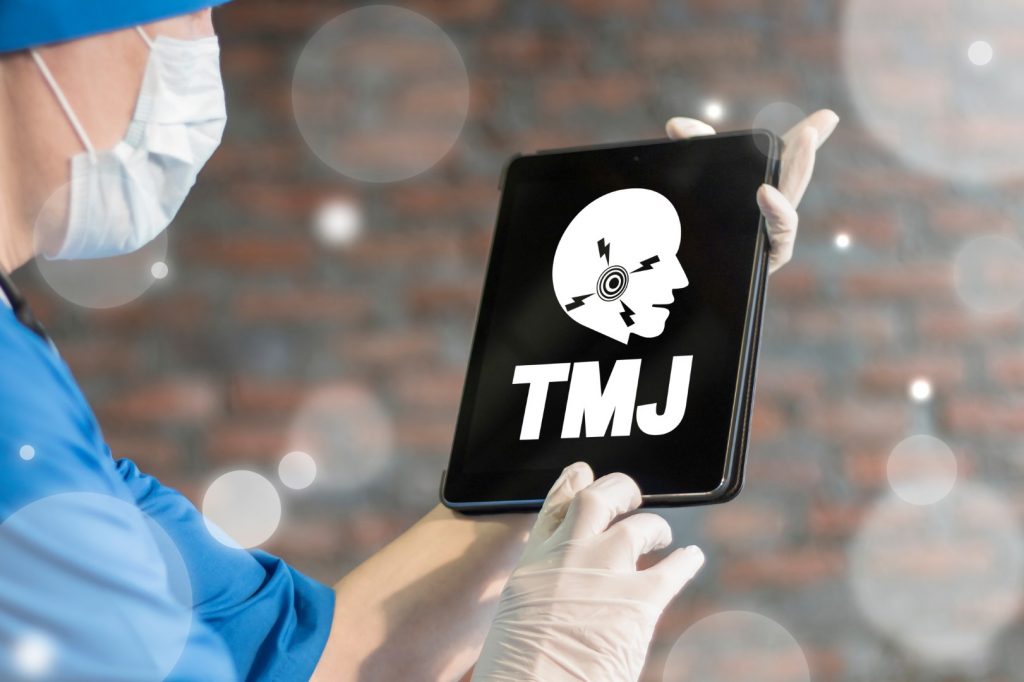Penn Dental Medicine is hosting a new patient Admissions Fair for Veterans on November 14th
Temporomandibular Joint Disorder (TMJ) is a painful, chronic disorder that affects millions of people. The temporomandibular joint is located near the ear and connects the jawbone with the skull. It’s a hinge-like jaw joint that allows us to move our jaw up and down and side to side. When this joint becomes inflamed or misaligned, it can cause a great deal of discomfort.
If you have joint pain or discomfort near the ear or jawbone, TMJ specialists in Philadelphia at Penn Dental Medicine (PDM) can diagnose if you are suffering from the condition and help determine your best treatment options.
What To Know About Causes, Symptoms, and TMJ Treatment in Philadelphia
 The temporomandibular joints are different from every other joint in the body. Unlike your shoulder or finger joints, which can work separately from each other, the temporomandibular joints should work together. If there is a problem with one of the joints, the other tries to compensate, which causes an imbalance.
The temporomandibular joints are different from every other joint in the body. Unlike your shoulder or finger joints, which can work separately from each other, the temporomandibular joints should work together. If there is a problem with one of the joints, the other tries to compensate, which causes an imbalance.
TMJ can be caused by a variety of factors, including:
- Trauma to the jaw or jaw muscles or facial muscles.
- Genetic abnormalities.
- Clenching or grinding of teeth (bruxism).
- Misalignment of the jaw joint.
- Arthritis.
- Chewing hard foods.
It is important to note that TMJ can be caused by more than one factor.
What Are the Symptoms of TMJ?
Common symptoms of TMJ include:
- Jaw, neck, and or shoulder pain.
- Earaches.
- Facial pain, tenderness, or swelling.
- Difficulty chewing.
- Difficulty opening or closing the mouth all the way.
- Headaches.
- Clicking or popping noises in the jaw.
Who Do I See for TMJ?

If you are experiencing any signs or symptoms that could indicate TMJ, it is important to consult with a doctor who understands musculoskeletal disorders (those affecting muscles, bones, and joints) and who is trained in treating pain conditions. The TMJ specialists in Philadelphia at PDM can diagnose the reason for your pain and determine treatment options.
Your TMJ specialist will first rule out whether your pain or discomfort is caused by:
- Medical conditions such as sinus or ear infections.
- Headaches that result from other factors.
- Teeth that are decayed or abscessed.
- Facial neuralgia: a condition characterized by nerve-related pain in the face.
- Tumors or oral and jaw bone cancers.
- Medical conditions related to connective tissue disorders.
- Lyme disease.
After determining that you are suffering from TMJ, your dentist will discuss effective treatment options.
What Are Available TMJ Treatments in Philadelphia?
Fortunately, there are many ways to treat TMJ. Treatments vary depending on the severity of the condition and may include:
- Lifestyle changes:
- Avoiding hard and crunchy foods as well as foods that need a lot of chewing.
- Sleeping on your back with your head supported.
- Stopping nail-biting.
- Reducing stress through yoga and other relaxation techniques.
- Correcting bad posture or ergonomics in work areas.
- Applying heat or ice packs to the painful area.
- Using muscle relaxants and TMJ pain solutions such as over-the-counter pain relievers like ibuprofen.
- Using physical therapy to help strengthen muscles around the joint.
- Learning jaw-relaxation techniques.
- Getting orthodontic treatment to realign the teeth, such as a splint or braces, mouth guards or a night guard for bruxism, and temporomandibular joint dysfunction prosthodontics.
- Undergoing surgical treatments to correct any structural issues that may be causing the discomfort.
- Arthrocentesis: Injecting fluid into the joint to wash away inflammation causes and reduce pressure.
- Arthroscopy: Operating on the joint through minute incisions with a tiny light, camera, and surgical tools to remove scar tissue, inject medicine, or reshape a joint.
- Open-joint surgery: Removing bony growths and performing other repairs to the joint or tissue through a longer incision.
What Happens if TMJ Is Left Untreated?
TMJ can cause further complications if left untreated, both medical and to your quality of life, such as chronic pain or hearing and inner ear problems, such as tinnitus and vertigo. It can also cause dental problems if teeth are worn down or broken because of grinding or clenching of teeth due to bruxism. You could also suffer from insomnia because of bruxism. Untreated TMJ can even result in malnutrition if chewing is compromised because of pain or jaw malfunction.
Where Should You Go for TMJ Treatment in Philadelphia?

For those living in Philadelphia or the surrounding tri-state area, Penn Dental Medicine is the leader in oral medicine temporomandibular joint disorder treatment. Your TMJ doctor has additional specialized medical training in musculoskeletal and pain disorders, including temporomandibular joint dysfunction prosthodontics, to fully understand the complexities of what causes TMJ and your unique situation and concerns.
As always, you’ll be welcomed by our combined staff of TMJ specialists and the University of Pennsylvania School of Dental Medicine faculty and students. You’ll receive cutting-edge, patient-friendly care at affordable costs backed by the program’s 125-year reputation. It’s a combination that you can’t find anywhere else.
If you think you’re suffering from TMJ, don’t leave it undiagnosed and untreated. Call our office at 215-898-8965 to schedule an appointment or use this form. We’ll get to the root of your problem and put you on the road to recovery fast.
In the meantime, if you have concerns about worn down or missing teeth, take advantage of our free prosthodontics consultation by completing this form.
Lastly, don’t forget to use our $25 off coupon on your first visit!
Get Your Appointment Now
We look forward to serving you and your family.




